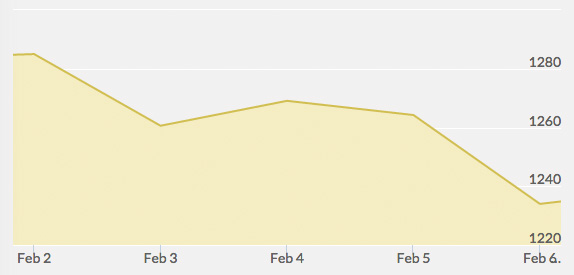
Open: $1,273.80 Close: $1,235.60 | High: $1,283.20 Low: $1,231.60
Monday opened the week having lost about $10 over the weekend, after closing January last week with the largest monthly gains in three years. Still, gold opened the week trading around 7% higher than this time in January. In world news, Greece’s new finance minister Yanis Varoufakis met with officials in Paris, London and Rome to renegotiate Athens’ debt. Chinese manufacturing took a dip for the second month in a row for January. However, physical gold buying is expected to ramp up ahead of the Lunar New Year on February 19.
By Tuesday, concerns over Greece’s debt had calmed, as it became clear that Varoufakis was asking for a debt swap rather than an abandonment of the euro. In response, the euro surged 10.5% and gold lost some of its safe haven appeal, dropping around $20 over the course of the day. The Reserve Bank of Australia announced it would be cutting interest rates, so in Australian Dollars, gold leaped to a high point. Shanghai’s stock market regained 2.5% of its losses from the previous day.
Gold prices endured a moderate lift on Wednesday as the People’s Bank of China lowered lending rates in response to sluggish economic growth. Many central banks resort to lowering interest rates in order to combat deflationary pressures; the PBoC is the 16th bank to cut rates this year.
“Gold looks attractive, as all central banks race to increase liquidity,” remarked Bill O’Neill, partner at Logic Advisors in New Jersey, in an interview with Bloomberg. He said the gold price “has probably found its bottom for now.”
Thursday, gold retreated as the European Central Bank announced a tougher stance on Greek debt—what should be bullish for gold. The ECB, starting February 11, will no longer accept government bonds from Greece as collateral for loans to Greece’s commercial banks. This will make it more difficult for Greece to pay back its debt and it will put more pressure on the country to enact new reforms. Though this news would be expected to increase safe haven demand for gold, the yellow metal actually slipped ahead of Friday’s payroll data, as investors anticipated clues about U.S. interest rates.
Gold sank on Friday, dropping 2.5% to hit a three-week low. U.S. jobs data came in better-than-expected—adding 257,000 jobs, significantly more than Wall Street’s expected 234,000. Gold fell almost $15 in only two minutes, retreating from January’s gains.


